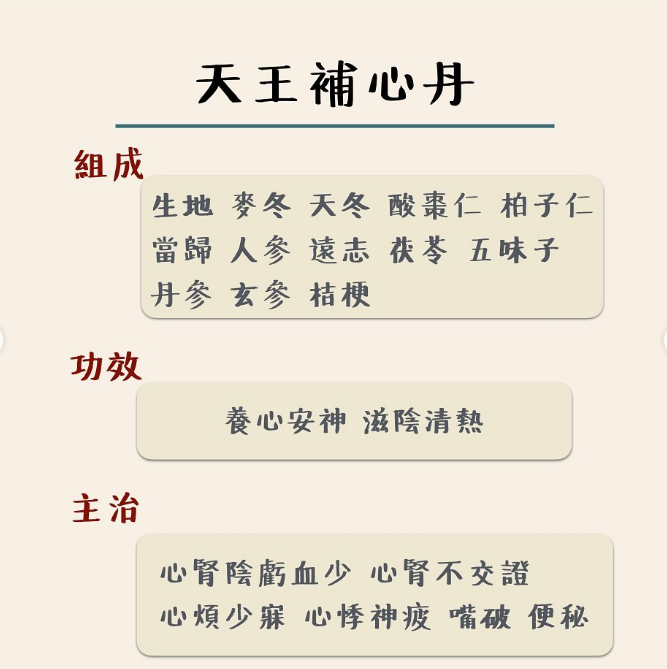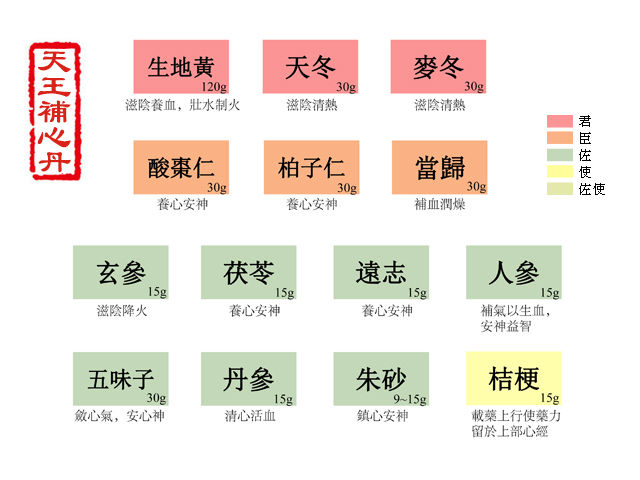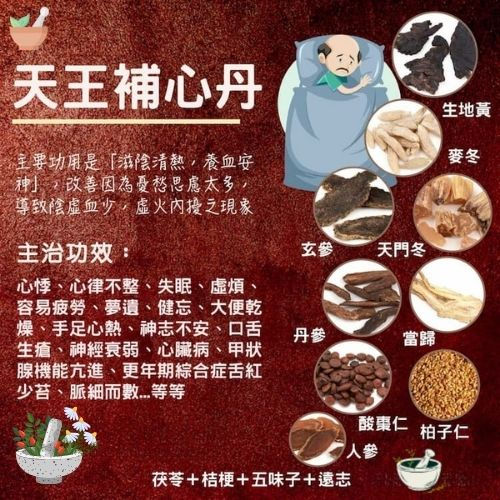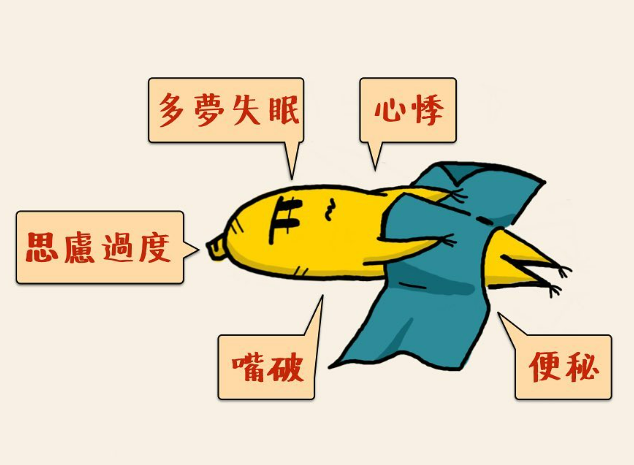Tianwang Buxin Dan: A good Chinese medicine prescription for nourishing yin, clearing heat, nourishing blood and calming the mind
- Hongji Medical

- Dec 29, 2024
- 6 min read
In the treasure house of traditional Chinese medicine, there is a famous prescription called "Tianwang Buxin Dan". This prescription is not only widely circulated in the medical community, but also left traces in literary works. In the famous novel "Dream of Red Mansions", there is a plot in which Lin Daiyu took this medicine. According to legend, this prescription was taught to the monks in the world by the guardian king of Buddhism.
The Legend of Tianwang Buxindan
The legend of Tianwang Buxin Dan can be traced back to the Sui and Tang Dynasties. At that time, there was a famous monk named Daoxuan, who practiced diligently and was particularly good at a kind of asceticism: for 90 consecutive days, he only walked or stood, did not sleep, did not sit or lie down, and focused on chanting the name of Buddha. This asceticism was very difficult and it was difficult for ordinary monks to persist, but Daoxuan performed such asceticism 21 times in his life, which shows how hard his practice was.

However, due to overwork, he was exhausted and eventually fell ill. At this time, Vaisravana, one of the four great guardian kings in Buddhism, appeared in his dream and taught him a prescription for healing his mind. Monk Daoxuan used this prescription to cure his illness and was able to continue his ascetic practice. Vaisravana is also translated as "Vaiśravaṇa", one of the four great kings. Usually, the first hall of a temple is dedicated to these four kings.
The ancient book "Fozu Tongji" of the Southern Song Dynasty also recorded that in the first year of Emperor Gaozong of the Tang Dynasty (650 AD), Monk Daoxuan "suffered from mental fatigue and illness, and Vaisravana gave him a prescription for nourishing the heart." Monk Daoxuan did not keep this prescription privately, but passed it on, and it has been passed down through the generations. Therefore, this prescription is called "Heavenly King Heart-Nourishing Pill".

However, there is no clear record of the specific combination of this prescription in many books. It was not until the end of the Ming Dynasty that a Confucian doctor named Hong Ji devoted himself to collecting and studying medical books and visiting famous doctors from all over the world. After twenty years of hard work, he obtained tens of thousands of prescriptions, among which was the formula of "Tianwang Buxin Dan". He recorded it in his book "Secret Anatomy of Health". Only then did the formula of "Tianwang Buxin Dan" become known to the public.
The efficacy and application of Tianwang Buxin Dan
Tianwang Buxin Dan is a tranquilizer, and its main function is to "nourish yin and clear heat, nourish blood and calm the mind". It is mainly used to improve the phenomenon of Yin and blood depletion caused by worry and excessive thinking, which leads to deficiency of both heart and kidney, deficiency of yin and blood, and internal disturbance of virtual fire. This prescription is an effective prescription for treating deficiency of yin and blood, internal disturbance of virtual heat, and restlessness.
Tianwang Buxin Dan is mainly used to treat symptoms such as palpitations, arrhythmia, insomnia, irritability, fatigue, nocturnal emission, forgetfulness, dry stool, hot hands and feet, restlessness, sores in the mouth and tongue, red tongue with little coating, and thin and rapid pulse caused by excessive thinking, deficiency of yin and blood, disharmony between the heart and kidney, and restlessness.
When the "heart meridian" is deficient in yin and blood, and the deficiency heat disturbs the heart, a series of diseases will occur. The Yellow Emperor's Classic of Internal Medicine mentions: "The heart is the monarch's organ, and the spirit comes out of it", "The heart is the master of the five internal organs and the six bowels, and the place where the spirit resides." Therefore, the symptoms of restlessness mainly occur in the heart in traditional Chinese medicine. The Yellow Emperor's Classic of Internal Medicine also says: "Yin Qi, when it is calm, the spirit is hidden, and when it is agitated, it disappears."
If a person's body is deficient in yin or if he thinks and works too hard, the yin and blood of the heart meridian will be damaged, the heart will lose nourishment and cannot store the spirit, then palpitations and insomnia will occur .
Since the heart governs the blood vessels, when the Qi and blood are abundant, the mind is nourished, and the intelligence is sharp and the spirit is full. If the mind is overworked and the heart blood is damaged, the heart blood is insufficient and one will feel tired.

When a person's Yin and blood are insufficient, internal heat (deficient fire) will be generated and disturb the heart, which will cause heat in the palms and soles, and deficiency and restlessness. In severe cases, men will have nocturnal emission. When the heart fire rises, oral and tongue sores will appear. Because "the tongue is the sprout of the heart", when the heart Yin is insufficient, the body is deficient in Yin and blood, and deficiency heat is disturbed, and Yin deficiency fire is strong, so the tongue is red with little coating, and the pulse is thin and rapid.
Tianwang Buxin Dan aims to nourish yin and clear away heat, nourish blood and calm the mind, and nourish yin and blood. It has the functions of nourishing water and suppressing fire, nourishing the heart and calming the mind. In the formula:
Use raw Rehmannia root to nourish yin, nourish blood and clear heat.
Asparagus cochinchinensis, Ophiopogon japonicus, and Scrophularia ningpoensis are sweet, cold, and rich in fluid. They can assist in nourishing yin and clearing heat, replenishing deficiency and fatigue, replenishing the five fatigues and seven injuries, nourishing heart yin, and relieving heart heat.
Use angelica to replenish yin blood, replenish deficiency and fatigue, and nourish new blood.
Using Danshen to "nourish the mind and calm the spirit, replenish new blood", it has the effects of nourishing the heart and calming the mind, calming the nerves and calming the mind, and treating forgetfulness, palpitations, and insomnia.
Ginseng, an important herb for replenishing qi, is used to "replenish the five internal organs and calm the spirit", while Poria cocos "benefits the spleen and calms the heart". It replenishes the heart qi, makes the qi strong and the blood is produced, and both have the effect of calming the mind and soothing the nerves.
It also uses sour jujube seeds, Polygonum aviculare, and cypress seeds to nourish the heart and calm the mind. Among them, sour jujube seeds "treat restlessness and insomnia", Polygonum aviculare "treats palpitations and insomnia", and cypress seeds "nourish the heart qi, moisten the kidney dryness, improve intelligence and calm the mind".
The ancient recipe used cinnabar as a coating to enhance its heat-clearing and calming effect. Since cinnabar is toxic, the modern Tianwang Buxin Dan has already removed cinnabar .
The efficacy of Tianwang Buxin Dan is similar to that of Guipi Tang, Zhigancao Tang, and Suanzaoren Tang, all of which aim to improve symptoms of palpitations, arrhythmia, forgetfulness, and insomnia. Tianwang Buxin Dan uses raw Rehmannia root to nourish yin and clear heat, and is combined with Chinese medicine for calming the nerves. Guipi Tang uses Chinese medicine to nourish qi and blood, strengthen the spleen and nourish the heart.

Addition and subtraction method: For those with severe insomnia, add dragon bone, magnet, etc. to enhance the calming effect. For palpitations and restless sleep, add longan meat and night clover to enhance the effect of nourishing the heart and calming the mind. If there is spermatorrhea, add golden cherry, gorgon fruit, oyster, etc. to consolidate the kidney and astringe the essence.
It is now used to treat insomnia and palpitations caused by neurasthenia, coronary heart disease, schizophrenia, heart disease, neurosis, hyperthyroidism, menopausal syndrome, etc., as well as recurrent oral acne, which are caused by deficiency of heart and kidney yin and blood.
Diet therapy combined with adjunctive therapy
While taking Tianwang Buxin Dan, some dietary therapy methods can better promote the therapeutic effect.
For example, you can eat more foods that nourish yin and clear heat, such as Tremella, Lotus seeds, Lily, Lycium barbarum , etc. These foods can help nourish yin and blood, clear heat and calm the mind, and complement the effects of Tianwang Buxin Dan.
Precautions and side effects
The ancient prescription contains cinnabar, which is poisonous and should not be used for a long time. Modern scientific Chinese medicine does not contain cinnabar and can be taken. This prescription contains many yin-nourishing ingredients and should not be taken for a long time by those with weak spleen and stomach, poor appetite, and loose stools.
Conclusion
Tianwang Buxin Dan is a traditional Chinese medicine prescription with a long history and remarkable efficacy. It is suitable for treating various symptoms caused by deficiency of yin and blood in the heart and kidney. Through correct use and dietary therapy, it can better exert its effects of nourishing yin and clearing heat, nourishing blood and calming the mind, and help patients recover their health.

